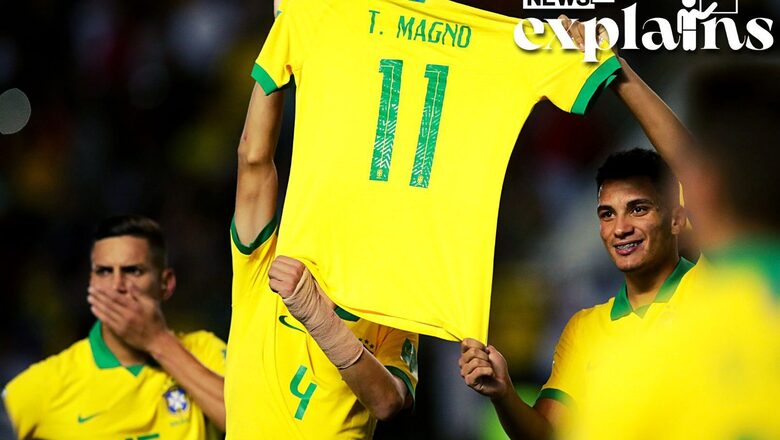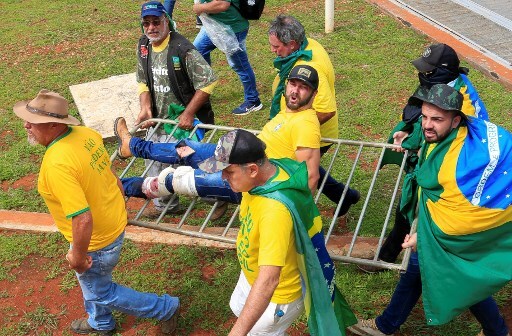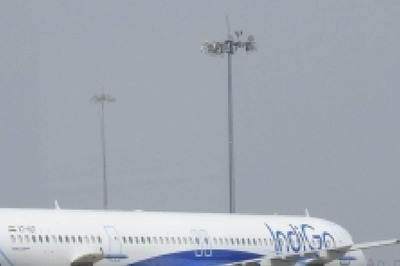
views
Supporters of deposed ex-President Jair Bolsonaro, dressed in the colours of the Brazilian flag, smashed windows and sowed havoc as they stormed into Congress on Sunday, urging “military intervention.”
The sea of yellow-and-green-clad “bolsonaristas” flooding up the ramps leading to the roof of the modernist Congress building evoked a similar attack almost exactly two years ago: the storming of the US Capitol building in Washington by supporters of then-President Donald Trump – a Bolsonaro ally.

Some forced their way into the Senate and Chamber of Deputies, leaving defacement in their wake as a protest against leftist President Luiz Inacio Lula da Silva, who was inaugurated exactly a week earlier.
But one peculiar thing was that rioters in Brazil’s capital Brasilia were mostly dressed in the country’s Auriverde flag and the jerseys of the national football team.
Outside of the country, the iconic jersey conjures up images of football legends such as Pele, Ronaldinho, and Ronaldo. However, supporters of far-right leader Bolsonaro have adopted the sports jersey as their uniform at home.
President Luiz Inácio Lula da Silva (also known as “Lula”), who has been urging all citizens to reclaim the attire, has launched a broad investigation into the security lapses that led to the insurgency.
How Did This Happen?
Corruption allegations swirled around the World Cup before Brazil hosted it in 2014. Thousands of people marched through major Brazilian cities dressed in flag colours to protest the government’s spending of millions of dollars to host the event. Many people wore their yellow uniform as a symbol of patriotism, a report by DW explains.
“When the corruption scandals broke out, there was an almost instant reaction of wearing the Brazilian national team shirt to say: I’m against corruption because I’m Brazilian,” Jamil Chade, a Brazilian author and journalist told DW.
However, protests against high public transportation and World Cup costs persisted after the tournament ended.
Protesters wearing the jersey demanded the impeachment of then-President Dilma Rousseff in 2015. She was eventually removed from power. The colours were seen on the streets of Brazil again in 2018, but this time they were seized by supporters of then-presidential candidate Bolsonaro.
His campaign was notorious for its use of national symbols such as the flag, the national anthem, and Brazil’s iconic yellow shirt. “That discontent was real, but it evolved into the Bolsonarista movement, which is now deeply rooted in the country,” Chade explained.
An Urge to Reclaim the Jersey
Brazilians who were distressed by such associations had hoped that the World Cup, which came on the heels of Bolsonaro’s electoral defeat to Luiz Inácio Lula da Silva, would have provided an opportunity to reclaim the colours and reconcile the country with the amarelinha, as the world-famous shirt is affectionately known, a report by the Guardian said.
“There is a struggle over the shirt, which fits into a larger struggle, a fight for Brazil and its national symbols,” historian Luiz Antonio Simas, who wrote a book about Rio de Janeiro’s Maracan stadium, told the Guardian.
During the election campaign, left-wing pop stars and politicians wore the canary yellow shirt in an attempt to reclaim it from the far right. The Brazilian Football Association (CBF) recently had also launched a campaign to depoliticize the football jersey.
Amauri Bevilacqua, 29, told the Guardian that he will wear the amarelinha while representing Brazil in the World Cup. To do otherwise would be “to let the other side take possession of a symbol that has always united all Brazilians, which is football”. However, the Rio-based environmental engineer is still hesitant to wear the shirt outside of match days for fear of being mistaken for a Bolsonaro supporter.
But the attempts seemed to have been in vain, as supporters who thronged the Congress wore the jersey with pride.
Sarah Lima, a production engineer who traveled 300 kilometers (about 186 miles) to join the protesters with her 19-month-old twin girls, said she wanted a vote recount to confirm whether Lula’s victory “really was true or not.”
She and her daughters, like many others in the crowd, were dressed in the jersey of the Selecao national football team appropriated by Bolsonaro and his backers as a symbol of nationalist fervor.
With inputs from AFP
Read all the Latest Explainers here



















Comments
0 comment